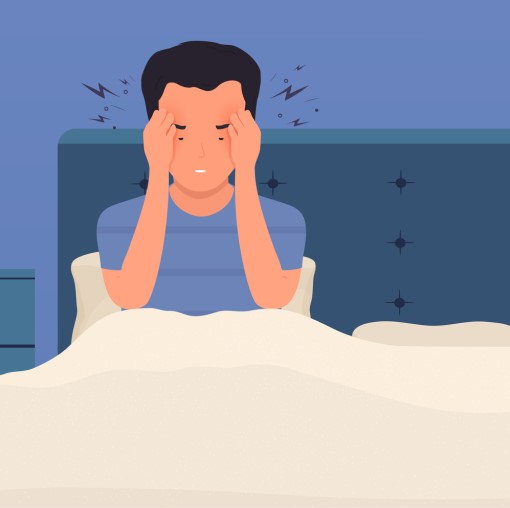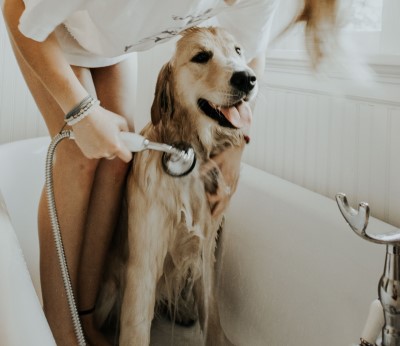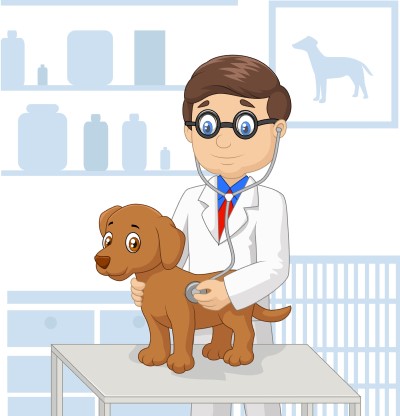
A Practical guide for sleeping with a dog: what to think about and remedies for 7 common issues
By Jason Wooden, PhD | May 22, 2022
There are many benefits from sleeping with a dog – bonding, well-being, stress reduction, and improved sleep. However, you may also struggle with accidents, allergies, night prowls, poor sleep quality, and strained relationships.
Fortunately, there are plenty of practical remedies you can try as you figure out what’s best for you and your dog.
CONTENTS:
1) Finding answers that work for you
2) Where SHOULD your dog sleep at night?
3) The many benefits from sleeping with a dog
4) 5 reasons why your dog shouldn’t sleep with you
5) Remedies for 7 common issues
6) What to do if it’s ruining a relationship!
7) Other things to do for more restful nights
If you’re sleeping with a dog, the real challenge is finding answers that work best for you
I’m not a dog expert but like millions of others I’m a big fan of them.
I remember sleeping with our dog when I was kid and later when I was an adult. Our pet dog was a fun and loving member of the family. I don’t recall there every being any serious objections to the sleeping arrangements.
Humans have a long history with man’s best friend. Archaeological evidence suggests dogs were domesticated as early as 30,000 years ago.
For something we’ve likely done for thousands of years, whether to sleep with a dog can sometimes be a challenging decision in the modern era.
Maybe you’ve have had a bad experience in the past…
Or maybe your dog has gotten used to sleeping with you and you’re starting to rethink things…
Perhaps, you’ve got a new dog and you just want to do what’s best for everyone, dog included.
You should know you’re likely not the only one debating the merits of this.
(Search online in forums and you’ll find people with strong opinions.)
Dogs are the most popular pet with around 50 million US households owning a dog and the same for 33 percent of pet owners worldwide.
Research has found that more than half of pet owners allow their pet to sleep in the bedroom.
(In surveys, 1 in 4 people even say they prefer sharing their bed with a dog than another person!)
With numbers like that, there’s bound to be more than a few debating the pros and cons of sleeping with a dog with plenty of opinions.
And plenty of opinions for the likely issues you’re going to run into.
However, what’s most important is to figure out what makes sense for your situation.
Where SHOULD my dog sleep at night?
Okay, while this may seem like a simple question, there’s more to it than you think.
Yes, the choices for where your dog should sleep at night our obvious – on the bed with you, in the room with you, or in a separate room.
However, dogs are pack animals, so there are going to want to be near you. One British study found that more than 80 percent of puppies will chose to sleep near a human if given the chance.
So, if you asked them, they’ll likely say the bed’s the place to be.
That’s why it’s important to honestly think about what’s in the best interest of the you AND your dog.
And that’s going to likely depend on the pros and cons for you AND your dog…
And whether you’re ready AND your dog is ready to take that step.
To help you figure this out, we’re going to take an honest look at the benefits, the downsides, and practical remedies for some of the more common issues pet owners run into when sleeping with a dog.
Some things to keep in mind:
- Dogs like having a spot to call their own whether it’s on the bed, a dog bed in the bedroom, or somewhere else
- What puppies need and what adult dogs need can differ
- If your dog is a puppy or recently adopted, you may want to take things slow
- Taking the time to crate train a new dog can make life easier
- Some dogs will be more comfortable on the floor than on the bed, some more active at night than others
- You may have to experiment with different sleeping arrangements
As you think about your own situation, hopefully you’ll be able to come an honest decision about what’s best for everyone.
If sleeping in the bed isn’t working out, you can create a place for them in the bedroom.
If that’s unworkable, you’ll need to look at your alternatives.
At the end the day, what’s most important for you both you AND your dog to be happy and comfortable.
There isn’t strictly a right or wrong answer.
Let’s take a look at the pros.

Some benefits from crate training:
- Security and comfort for your dog
- Easier potty training
- Can help with separation anxiety
- Safe place to keep a puppy or older dog out of trouble
- Easier to transport a dog
- Easier vet visits
Learn more: How to Crate Train Your Dog (American Kennel Club)
Pros: The many benefits from sleeping with a dog
There are more benefits from sleeping with a dog than you may realize. Some are obvious, others not so obvious.
The list of positives includes:
Companionship – it’s hard to beat the unconditional love of a dog
Safety – with their heightened sense of hearing and smell, having a dog around can put you at ease
Bonding – build a stronger connection with your dog
Less loneliness – with a friendly four legged companion nearby you’re not alone
Well being and mental health – the owner-dog connection has been shown to result in better mood, less depression, less anxiety, fewer PTSD symptoms, and a sense of calm
Stress reduction – research has shown that interacting with a dog can lower stress hormones and increase the feel good hormone oxytocin
Improved sleep – in a Mayo clinic survey as many as 40 percent of people perceived their pets as unobtrusive or even beneficial to sleep
Fewer allergies – reduced asthma and allergies in kids, early exposure to allergens carried by dogs seem to have positive impact later in life
After reading this list, you’re probably asking what’s to lose?
Well, now we need to take an honest look at the possible downsides from sleeping with a dog.
Cons: 5 reasons why your dog shouldn’t sleep with you
As fun and loving dogs are, having them sleep with you can sometimes turn what should be a positive into something negative.
So, why shouldn’t your dog sleep with you?
Some reasons you may want to hold off having a dog in your bedroom are:

Accidents
Who wants to wake up in the middle of the night to wet blankets? Most people are aware that puppies can have accidents, especially if not house trained.
Older dogs with medical conditions can have accidents too whether it’s peeing, throwing up, or diarrhea.

Poor sleep for you and others
Depending on how light of a sleeper you are, this may be a show stopper.
A dog that moves too much or is too big for the bed can wreck your sleep. Ditto, if they’re big snorers.

Your dog may get into trouble
For various reasons, some dogs may get restless at night, go on the prowl, and misbehave.

Allergies
Fur and dander from pets can easily spread across pillows, bedding, and carpets.
While sleeping with a dog may be beneficial for allergies for kids, as many as 20 percent of people struggle with allergies to dogs and cats. Likewise, 30 percent of people with asthma have pet allergies.

Health risks
Allergies isn’t the only health risk from sleeping with a dog. There’s the possible exposure to fleas, ticks, worms, mites, and other critters especially if your dog spends a lot of time outdoors.
Pregnant moms and people with weakened immune systems should be extra careful around pets.
Like anything else in life, sleeping with a dog comes with possible upsides and downsides.
Next, we’ll take look at what you do about some of the more likely issues you may run into and then you can decide what makes the best sense for you
Making things work: Remedies for 7 issues people struggle with when sleeping with a dog
Let’s assume you’ve thought things through and you’ve decided you want to give sleeping with a dog a try. So, what can you do to give things the best chance?
Depending on your situation, there are answers for many of the more commonly encountered issues:

1) Accidents
For younger dogs, make sure they’re potty trained before allowing them to sleep with you. With all dogs, it’s important to keep them on a regular schedule where they get to go out and pee before bed time.
Learn more:
How to Potty Train Puppies (American Kennel Club)
How to Stop Your Dog From Peeing Inside at Night (Animal Wised)

2) Odor
If you have a dog that likes to get into things that smell, that can be a challenge come bedtime. Ditto if they’re smelly for other reasons such as bad breath, too much time outside, or specific health issues.
Start with regular grooming and bathes. A trip to the vet may be necessary if the cause isn’t obvious.

3) Prowling troubles
Make sure they’re getting plenty of exercise and stimulation during the day. Also, make sure they’ve eaten and have a had a chance to potty before bedtime.
Schedule a visit with a vet if you suspect there’s a medical issues that’s agitating them to roam at night.
For some dogs, keeping them in a crate may be the best option at least on temporary basis
Learn more:
Is Your Dog Restless at Night? Here’s What’s Going On (dogster.com)

4) Jealousy
Sometimes a dog may growl, bark, or show other aggressive behaviors towards a partner. Whether it’s because of jealousy or other reasons, that’s going to put a strain on relationships at night.
Dog experts recommend you consistently ignore the bad behavior and reward good behavior. You may even have to keep your dog out of the bed for a while as you figure things out.
Fortunately, there are plenty of practical steps you can take:
What to Do if Your Dog Is Jealous (Pets WebMD)
8 signs your dog is jealous of your partner and how to deal with it (Country Living)

5) Poor sleep
Getting a bigger bed may help if things have gotten too crowded. Try ear plugs or white noise to block out dog snoring.
If you’re dealing with an overactive dog, make sure it’s gotten plenty physical activity during the day. Otherwise, you can try having them sleep on the floor or another room until they’re better trained.
If it’s dog allergies that’s wrecking your sleep, read on.

6) Allergies
You should know that the Asthma and Allergy Foundation of America recommends that you keep your pets out of the bedroom if you have allergies to them.
If you’re prone to allergies and still want to give sleeping with your dog a try, your options range from allergy meds to wearing a mask, more frequent grooming, washing your bedding more often, and various other remedies.

7) Health risks
For starters, make sure your dog is up to date with vaccines. Regular grooming and keeping your dog in good health will also help.
It’s also worth having a chat with a vet and your doctor especially if you’re pregnant or immunocompromised. They may recommend you keep your dog out of the bed.
Learn more:
How to Stay Healthy Around Pets (CDC)
Simple steps for avoiding infections (Harvard Health Blog)
Help! Sleeping with a dog in the bed is ruining my relationship…
Aggressive or jealous behaviors isn’t the only way sleeping with a dog can strain a relationship with a spouse or partner.
They may also have objections because of hygiene concerns, poor sleep quality, lack of alone time, or a lack of attention. It could be that your dog interferes with intimacy in other ways too.
It’s important to have an honest and respectful conversation so you can better understand what the specific concerns are and how they may be addressed.
That way you can see if there’s a possible compromise that works for both of you. The list of remedies will help you with some of the more common challenges.
However, depending on the issue, there may not be any good answers if it’s something pretty serious such as a significant health risk.
Also, in some situations, there may be a more serious conversation to be had depending on the relationship. Your disagreement over sharing the bed with the dog could be a sign of deeper issues.
Other things you should be doing for more restful nights when sleeping with a dog
It’s likely that sleeping with a dog isn’t the only thing you’re up against at night. After all, every night 1 in 3 adults struggle with poor sleep for a variety of reasons.
Unfortunately, there’s a long list of things that affect sleep.
The good news is there are some other things you should do that can make a big difference for your sleep.
A) Sleep hygiene
Start with practicing good sleep hygiene, the everyday habits known to affect sleep.
For better sleep, you should:
- keep consistent wake up & sleep times
- avoid naps
- exercise
- avoid large meals, alcohol, or stimulants such as caffeine before bedtime
- maintain a regular bedtime routine
- avoid using TVs, laptops, or other electronics before sleep
- keep your bedroom dark, cool, quiet, & relaxing
B) Get a check up
Seeing a doctor can be helpful, especially if poor sleep is an ongoing issue for you. Many people are surprised at how many health issues can make it harder to sleep.
The list includes chronic pain, heartburn, cancer, dementia, asthma, and even medications. You may also be living with an undiagnosed sleep disorder such as sleep apnea.
When is the last time you’ve had a physical? If you don’t deal with these underlying issues, you may be just sticking a band aid on things.
C) Counseling
Many people struggling with stress, anxiety, or depression sleep poorly.
It’s worth having a chat with someone if you find yourself feeling down or overly anxious about things.
A type of counseling known as cognitive behavioral therapy (CBT) has been found to be effective for both anxiety and depression. It focuses on changing thinking and behavioral patterns.
Sources:
1. “The Most Popular Animals Owned As Pets In The US”, World Atlas
2. “INFOGRAPHIC: Most of world owns pets; Dogs are tops”, petfoodindustry.com
3. Are Pets in the Bedroom a Problem?. Mayo Clin Proc. 2015 Dec;90(12):1663-5.
4. “No Big Surprise: Survey Says 1 in 4 People Prefer Sharing a Bed With Their Dogs Over Their Partners”, 2021, Daily Paws
5. Sleep Duration and Behaviours: A Descriptive Analysis of a Cohort of Dogs up to 12 Months of Age. Animals (Basel). 2020 Jul 10;10(7):1172.
6. “Where Should Your Dog Sleep? Pros And Cons Of The Various Dog Sleeping Options”, 2022, Tractive
7. “Where Do Dogs Sleep at Night?”, 2015, American Kennel Club
8. “The Pros and Cons of Sleeping With Your Pets”, 2021, Psychology Today
9. “The Friend Who Keeps You Young”, Johns Hopkins Medicine
10. Are Pets in the Bedroom a Problem?. Mayo Clinic Proceedings VOLUME 90, ISSUE 12, P1663-1665, DECEMBER 01, 2015
11. “How to Stay Healthy Around Pets”, CDC website
12. Pet-keeping in early life reduces the risk of allergy in a dose-dependent fashion. PLoS One. 2018; 13(12): e0208472.
13. Dog and Cat Allergies: Current State of Diagnostic Approaches and Challenges. Allergy Asthma Immunol Res. 2018 Mar; 10(2): 97–105.
14. “25 Noteworthy Allergy Statistics & Facts to Know in 2022”, 2021, MedAlertHelp.com
Connect with us:
About Us
Better Sleep Simplified® was founded as a place for you to get clear and well-researched information.
Our goal is to make sure you know about your options so that you take action sooner rather than later.
Check us out on YouTube:
Watch and Learn
Helpful sleep tips, interesting sleep facts and statistics you want to know about
Affiliate Disclosure
This site is a participant in the Amazon Services LLC Associates Program and other affiliate advertising programs designed to provide a means for sites to earn advertising fees by advertising and linking to them.
Important: BetterSleepSimplified.com is for informational purposes only and is not intended or implied to be a substitute for professional medical advice, diagnosis, or treatment. Always consult a physician for sleep and health concerns. See additional information.
